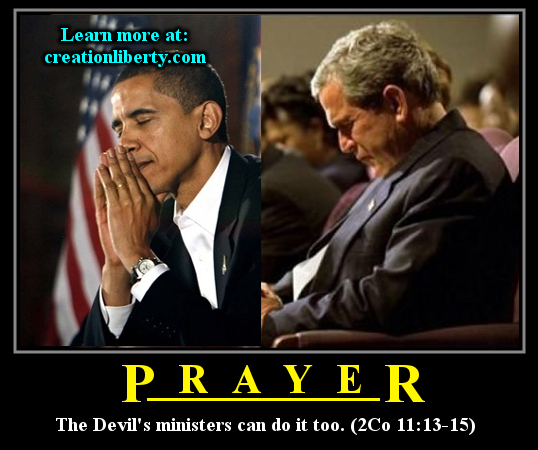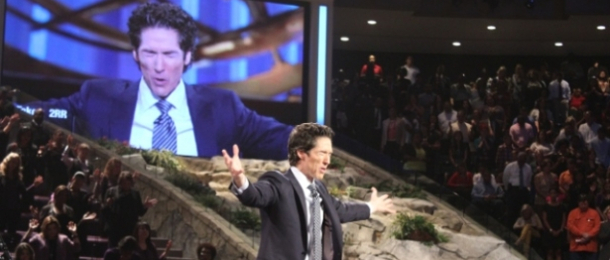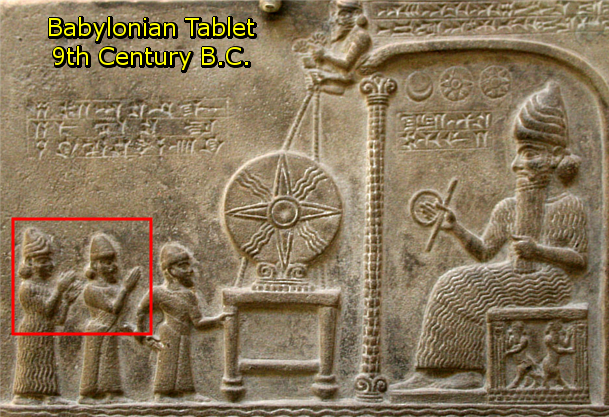I've received many letters over the years from Christians asking generally about prayer, what they should say, the way they should say it, what things to pray for, etc. Though the average church-goer might ignore this teaching, writing it off as a simple issue that doesn't require much knowledge, most of them are completely (and willfully) ignorant that the traditions most of us have learned in church buildings about prayer have no real Biblical foundation.
Let's first get a general overview of the different ways the word "pray" can be used in context:
pray (v): 1. to ask with earnestness or zeal; to entreat
2. to petition, ask as a favor
3. to address the Lord God in reverence, asking for mercy, giving thanks
4. to humbly request, to beg
(See 'pray', American Dictionary of the English Language, Noah Webster, 1828, retrieved Jan 19, 2016 [webstersdictionary1828.com])
And it came to pass, when he was come near to enter into Egypt, that he said unto Sarai his wife, Behold now, I know that thou art a fair woman to look upon: Therefore it shall come to pass, when the Egyptians shall see thee, that they shall say, This is his wife: and they will kill me, but they will save thee alive. Say, I pray thee, thou art my sister: that it may be well with me for thy sake; and my soul shall live because of thee.
-Genesis 12:11-13
(Read "God Does Not Justify Lies" here at creationliberty.com for more details.)
When asked what prayer is, the average church-goer usually responds that it is putting your hands together, bowing your head, and talking with God, because that's all they've ever been taught, but that is not correct. It is possible to talk with the Lord Jesus Christ without prayer, just as it is possible to talk to another person without prayer. It is important for us to understand that prayer is a humble and/or formal request, and that will help us understand more details about the what, how, when, and where.
The Lord Jesus Christ, being graceful to the Gentiles, knowing that the Gospel was going to us, gave us a model for understanding how to pray. In Matthew 6, Christ points out a very common thing we see many church-goers doing today, and He specifically tells us not to be like them:
And when thou prayest, thou shalt not be as the hypocrites are: for they love to pray standing in the synagogues and in the corners of the streets, that they may be seen of men. Verily I say unto you, They have their reward.
-Matthew 6:5
Most people reading this have probably been in a church building, or watched a program, in which some preacher prays for 5, 10, 20 minutes or more, to the point where you're not even concentrating on praying anymore, but are beginning to wonder when he's going to shut up. You're not alone; it's just that many church-goers don't want to talk about it because it might make them sound bad to everyone else. These men/women pray to put on a show, not to make requests to the Lord Jesus Christ. I don't care how much they claim to be praying to the Lord God, He told the hypocrites and heathen:
And when ye spread forth your hands, I will hide mine eyes from you: yea, when ye make many prayers, I will not hear: your hands are full of blood.
-Isaiah 1:15
Take thou away from me the noise of thy songs; for I will not hear the melody of thy viols. But let judgment run down as waters, and righteousness as a mighty stream.
-Amos 5:23-24
And why call ye me, Lord, Lord, and do not the things which I say?
-Luke 6:46

For such are false apostles, deceitful workers, transforming themselves into the apostles of Christ. And no marvel; for Satan himself is transformed into an angel of light. Therefore it is no great thing if his ministers also be transformed as the ministers of righteousness; whose end shall be according to their works.
-2 Corinthians 11:13-15
Woe unto you, scribes and Pharisees, hypocrites! for ye devour widows' houses, and for a pretence [i.e. presentation/show] make long prayer: therefore ye shall receive the greater damnation.
-Matthew 23:14

Beware of the scribes, which desire to walk in long robes, and love greetings in the markets, and the highest seats in the synagogues, and the chief rooms at feasts; Which devour widows' houses, and for a shew make long prayers: the same shall receive greater damnation.
-Luke 20:46-47
But thou, when thou prayest, enter into thy closet, and when thou hast shut thy door, pray to thy Father which is in secret; and thy Father which seeth in secret shall reward thee openly.
-Matthew 6:6
On the morrow, as they went on their journey, and drew nigh unto the city, Peter went up upon the housetop to pray about the sixth hour:
-Acts 10:9
For they that are such serve not our Lord Jesus Christ, but their own belly; and by good words and fair speeches deceive the hearts of the simple.
-Romans 16:18
But when ye pray, use not vain repetitions, as the heathen do: for they think that they shall be heard for their much speaking. Be not ye therefore like unto them: for your Father knoweth what things ye have need of, before ye ask him.
-Matthew 6:7-8
The Lord Jesus Christ continues to give us an outline for how to pray in what is known commonly today as "The Lord's Prayer." There's nothing wrong with memorizing Scripture and repeating it, but the mistake most church-goers make (likely being influence by the wicked Catholic Church) is to teach their children to say the Lord's prayer every night before they go to bed.
What we are going to read in Matthew 6 is simply an outline for how we should pray, not a direct word-for-word statement we take to God over and over. We are going to slowly go over each verse of this prayer, analyze what Christ is telling us, and then summarize it.
After this manner therefore pray ye: Our Father which art in heaven, Hallowed be thy name.
-Matthew 6:9
And it shall come to pass, that in the place where it was said unto them, Ye are not my people; there shall they be called the children of the living God.
-Romans 9:26
For ye were sometimes darkness, but now are ye light in the Lord: walk as children of light:
-Ephesians 5:8
And call no man your father upon the earth: for one is your Father, which is in heaven. Neither be ye called masters: for one is your Master, even Christ.
-Matthew 23:9-10
Next, we give reverence and honor to the name of Christ.
hallowed (v): treated as sacred; reverenced
(See 'hallowed', American Dictionary of the English Language, Noah Webster, 1828, retrieved Jan 19, 2016 [webstersdictionary1828.com])
Thy kingdom come. Thy will be done in earth, as it is in heaven.
-Matthew 6:10
Give us this day our daily bread.
-Matthew 6:11
And forgive us our debts, as we forgive our debtors.
-Matthew 6:12
For if ye forgive men their trespasses, your heavenly Father will also forgive you: But if ye forgive not men their trespasses, neither will your Father forgive your trespasses.
-Matthew 6:14-15
Take heed to yourselves: If thy brother trespass against thee, rebuke him; and if he repent, forgive him. And if he trespass against thee seven times in a day, and seven times in a day turn again to thee, saying, I repent; thou shalt forgive him.
-Luke 17:3-4
There are many new-age church-goers out there who would find this to be horrible for a pastor to do, but what this man did was Biblical. The Lord God does not forgive those who have not been humbled to repentance.
(Read "Is Repentance Part of Salvation?" here at creationliberty.com for more details.)
But he giveth more grace. Wherefore he saith, God resisteth the proud, but giveth grace unto the humble.
-James 4:6
Repent therefore of this thy wickedness, and pray God, if perhaps the thought of thine heart may be forgiven thee.
-Acts 8:22
And lead us not into temptation, but deliver us from evil: For thine is the kingdom, and the power, and the glory, for ever. Amen.
-Matthew 6:13
The average church-goer is unaware of what 'amen' means; they simply say it because they were taught to say it, blindly following tradition. 'Amen' is a Hebrew word that means 'truly,' or in other words, it's a verbal affirmation to the truth of the statements made. Christians should be cautious not to say "amen" to any prayer given, but only if the words were true, and only if we are in agreement with what has been said. (This is another reason why the gibberish they falsely call "speaking in tongues" is so dangerous since no one can understand what's being said.)
(Read "Speaking in Tongues" here at creationliberty.com for more details.)
Now let's recap:
|
The problem is not praying for others; the problem is the lack of Biblical foundation. They teach them how to pray for details of their neighbors' troubles, illness, etc, and they teach them to trust in the emotions of their heart through long, drawn-out prayers that put on a show for men, without teaching them the humility and sanctification with which to properly approach the Lord God. In simple terms, they're putting the cart before the horse.
However, now that we have a basic foundation on what we ought to do in prayer, let's continue to look at some more details.
But pray ye that your flight be not in the winter, neither on the sabbath day:
-Matthew 24:20
Bless them that curse you, and pray for them which despitefully use you.
-Luke 6:28
These are just a few of many verses we could cover, but before anyone starts to feel anxiety about having to make a long list of things to pray for every morning and evening, please keep in mind that these verses have a context. Most of these are conditional, meaning that the prayer is based on the specific subject matter and/or events occurring at the time.
In the letter to the Hebrews, Paul says:
Pray for us: for we trust we have a good conscience, in all things willing to live honestly.
-Hebrews 13:18
But I beseech you the rather to do this, that I may be restored to you the sooner.
-Hebrews 13:19
Examine yourselves, whether ye be in the faith; prove your own selves. Know ye not your own selves, how that Jesus Christ is in you, except ye be reprobates?
-2 Corinthians 13:5
Pray ye therefore the Lord of the harvest, that he will send forth labourers into his harvest.
-Matthew 9:38
And Jesus went about all the cities and villages, teaching in their synagogues, and preaching the gospel of the kingdom, and healing every sickness and every disease among the people. But when he saw the multitudes, he was moved with compassion on them, because they fainted, and were scattered abroad, as sheep having no shepherd. Then saith he unto his disciples, The harvest truly is plenteous, but the labourers are few; Pray ye therefore the Lord of the harvest, that he will send forth labourers into his harvest.
-Matthew 9:35-38
Keeping in mind that the Lord God knows what we have need of before we ask Him, and that the Lord God ponders the heart...
Every way of a man is right in his own eyes: but the LORD pondereth the hearts.
-Proverbs 21:2
Of course, every church-goer on the planet will say that their prayers are genuine, but I don't commonly see that to be the case. I typically see a large problem of people praying for others to make an impression, or praying for others out of a duty of obligation, rather than praying genuinely from a pure heart of good conscience.
Many years ago, back when I attended church buildings, I saw a call to impress others to keep up appearances more than anything else. Prayer requests would come out for this person having a problem and that person having a problem, and everyone would bow their heads and pray for those people, and then hand out pieces of paper with all the prayer requests on them. However, isn't this supposed to be the Body of Christ? These people are supposed to be brothers and sisters in spirit, and see each other at least once a week if not more, so why do they need a list?
Some people may still not understand the problem I'm pointing out, so let's suppose, for example, your dad was killed in a car accident and your mother was left widowed. Would you need a note to remind you to pray for your mother? Of course not. Why not? You don't need a reminder to pray for the people who you're closely involved with, and people whose circumstances you intimately understand. For a born-again Christian, there is an automatic conviction to make requests to the Lord God on their behalf, and that is what the Lord God sees as a genuine concern. The problem I see is that in new-age church buildings, there are many people (not all, but many) who participate in prayer because it's a convenient excuse to not be involved, and to not have to do anything to help.
If a brother or sister be naked, and destitute of daily food, And one of you say unto them, Depart in peace, be ye warmed and filled; notwithstanding ye give them not those things which are needful to the body; what doth it profit? Even so faith, if it hath not works, is dead, being alone. Yea, a man may say, Thou hast faith, and I have works: shew me thy faith without thy works, and I will shew thee my faith by my works.
-James 2:15-18
With that understanding, I'd like to point out that Christ did not tell us to pray that more prayer warriors would appear to help those who were scattered abroad, but to pray for LABORERS (i.e. doers of the Word) to help. I would exhort all Christians to never let prayer become a convenient replacement for real work, because even today, we have praying people everywhere, but few laborers.
| Food for thought: After understanding how many false converts are in the church buildings of America today, how many of those 'prayer warriors' do you think are false converts? |
I want to repeat that praying for others is not wrong, and that we ought to pray for others, but there is more to this subject that Christians need to consider. First, the Bible tells us we, in our limited view of this world, do not know what we ought to pray for on our own:
Likewise the Spirit also helpeth our infirmities: for we know not what we should pray for as we ought: but the Spirit itself maketh intercession for us with groanings which cannot be uttered.
-Romans 8:26
And whatsoever ye shall ask in my name, that will I do, that the Father may be glorified in the Son. If ye shall ask any thing in my name, I will do it.
-John 14:13-14
If you ask Christ to make God lie, will He do it for you? If you ask Christ to change His Word to allow adultery, would He do it? The problem is that in the typical church building, "any thing" is taken to mean "whatever your imagination can conceive," but the truth is that whatever thing is asked must be within the will of God.
For example, a man could pray to Christ that he would move into a particular city and make a lot of money doing business there. Even though he prayed in the name of Christ, it doesn't mean it lines up with the will of the Father.
Go to now, ye that say, To day or to morrow we will go into such a city, and continue there a year, and buy and sell, and get gain: Whereas ye know not what shall be on the morrow. For what is your life? It is even a vapour, that appeareth for a little time, and then vanisheth away. For that ye ought to say, If the Lord will, we shall live, and do this, or that.
-James 4:13-15
Thy kingdom come. Thy will be done in earth, as it is in heaven.
-Matthew 6:10
But Jesus beheld them, and said unto them, With men this is impossible; but with God all things are possible.
-Matthew 19:26
And he said, Abba, Father, all things are possible unto thee; take away this cup from me: nevertheless not what I will, but what thou wilt.
-Mark 14:36
In the scenario, neither I, nor the lady, knew what was best in the situation, but she assumed that getting better was the will of God for that man. I agreed to pray for him, but I know nothing about him, so instead I prayed that if the man's health was within the will of God, then I asked Him to heal the man, but if not, then I prayed the Lord God would ignore my request and do what was best to the saving of the man's soul and sanctification for the glory of the Lord Jesus Christ.
Even Paul was stricken with illness by Satan's messenger, but it was the will of God for the purpose of humbling Paul:
And lest I should be exalted above measure through the abundance of the revelations, there was given to me a thorn in the flesh, the messenger of Satan to buffet [i.e. strike or hit] me, lest I should be exalted above measure. For this thing I besought the Lord thrice, that it might depart from me. And he said unto me, My grace is sufficient for thee: for my strength is made perfect in weakness. Most gladly therefore will I rather glory in my infirmities, that the power of Christ may rest upon me. Therefore I take pleasure in infirmities, in reproaches, in necessities, in persecutions, in distresses for Christ's sake: for when I am weak, then am I strong.
-2 Corinthians 12:7-10
And he that searcheth the hearts knoweth what is the mind of the Spirit, because he maketh intercession for the saints according to the will of God. And we know that all things work together for good to them that love God, to them who are the called according to his purpose.
-Romans 8:27-28
The way of a fool is right in his own eyes: but he that hearkeneth unto counsel is wise.
-Proverbs 12:15
Every way of a man is right in his own eyes: but the LORD pondereth the hearts.
-Proverbs 21:2
As many as I love, I rebuke and chasten: be zealous therefore, and repent.
-Revelation 3:19
And ye have forgotten the exhortation which speaketh unto you as unto children, My son, despise not thou the chastening of the Lord, nor faint when thou art rebuked of him:
-Hebrews 12:5
On the other hand, we need to also look at James 5:
Is any among you afflicted? let him pray. Is any merry? let him sing psalms. Is any sick among you? let him call for the elders of the church; and let them pray over him, anointing him with oil in the name of the Lord: And the prayer of faith shall save the sick, and the Lord shall raise him up; and if he have committed sins, they shall be forgiven him. Confess your faults one to another, and pray one for another, that ye may be healed. The effectual fervent prayer of a righteous man availeth much. Elias was a man subject to like passions as we are, and he prayed earnestly that it might not rain: and it rained not on the earth by the space of three years and six months. And he prayed again, and the heaven gave rain, and the earth brought forth her fruit.
-James 5:13-18
|
I have had to abandon numerous traditions I've learned growing up in church buildings, and be built up solely on the foundation of what God's Word tells us to do, but a common tradition that will be hard for many Christians to understand is the clasping of hands together as a symbol for prayer. Most church-goers simply do this out of habit because they were taught it by example, but if we look carefully, we will not find any commandment in Scripture to do such a thing, and worse still, nearly every pagan religion around the world prays with clasped hands.  We born-again elect of Christ need to ask ourselves: If that tradition didn't come from the Bible, where did it come from? Some Catholic websites I've seen attempt to justify the praying hands tradition by referring to The Book of Jewish Knowledge, claiming that Christians adopted it from the Jews: "It has also been commonly assumed that folding the hands in prayer is exclusively a Christian custom. This is not the historical fact at all. As early as the post-Exilic period, when Jews prayed, they folded their hands, and -Nathan Ausubel, The Book of Jewish Knowledge: An Encyclopedia of Judaism and the Jewish People, Covering All Elements of Jewish Life from Biblical Times to the Present, Crown Publishers, 1969 There are some problems with this; the first being that when he says "Christian," he's referring to the Catholic Church that has nothing to do with Christianity. The next problem is that his information is coming from the Jewish Talmud, the book that forms the foundation for Kabbalah, which is Babylonian/Jewish mysticism: "Raba removed his cloak, -Isadore Epstein, The Babylonian Talmud, Vol. 2, Soncino Press, 1935, p. 34 So the clasping of hands to pray is never found in the Torah, but it is found in a book written by Jews who had turned to pagan rituals. Ancient Babylonian documentation shows us that praying with clasped hands was a tradition of their sun god worship, as depicted in the Tablet of Shamash:  The scene depicts pagan high priests rebuilding the statue of their god, and specifically notice the clasped hands as they pray to and worship the statue. This was a pagan tradition that has been handed down to pagan religions for thousands of years, so just like altars, witchcraft holidays, and numerous other traditions, where do you think the modern day church buildings adopted this tradition from? As we have covered in many other articles on paganism and witchcraft (like Christmas & Easter), Babylon was the center of sun god paganism, which was then spread out to pagan nations around the world, all collected and unified together by pagan Rome, and then through the Catholic Church was distributed into the leavened church buildings around the world.  Witches still use the "praying hands" today in their spell casting rituals. For example, this Wiccan author teaches readers to channel their energy and use visualization techniques for their sorcery, then says: "Continue to draw the energies of the earth into your body in this way until you feel it blend with the energies of the sun. When you are finished, open your eyes and -Timothy Roderick, Wicca, Llewellyn Worldwide, 2005, p. 203, ISBN: 9780738706214; Roderick is a psychologist and experienced witch who founded the EarthDance Collective, a group that promotes feminist witches. Buddhists specifically teach the hand palms together as a symbol of achieving enlightenment through Buddha: "Bring your -Opposing Views, "How to Pray As a Buddhist," retrieved Jan 22, 2016, [people.opposingviews.com/pray-buddhist-5307.html]  Religious cults throughout the world use the 'praying hands' for prayers to their false gods, and as a symbol of cycling energies in the body. More evidence of this is seen in the common eastern greeting: "In the East, -Gary Gach, The Complete Idiots Guide to Understanding Buddhism, Penguin, 2004, p. 154, ISBN: 9781592572779 Sadly, there are a number of Christians out there still displaying their praying hands symbols on pillows, paintings, Facebook profile images, etc. As we have covered in previous teachings, we ought not to think that God is represented in such icons. (Read "Christian Symbols Are Not Christian here at creationliberty.com for more details.)
Forasmuch then as we are the offspring of God, we ought not to think that the Godhead is like unto gold, or silver, or stone, graven by art and man's device. |
We ought to make sure that our traditions are not negatively affecting the Word of God, and that includes the traditions concerning prayer.
Making the word of God of none effect through your tradition, which ye have delivered: and many such like things do ye.
-Mark 7:13
The Bible does say that in 1 Thessalonians:
Pray without ceasing.
-1 Thessalonians 5:17
Even the verse before that says:
Rejoice evermore.
-1 Thessalonians 5:16
For precept must be upon precept, precept upon precept; line upon line, line upon line; here a little, and there a little:
-Isaiah 28:10
Prove all things; hold fast that which is good.
-1 Thessalonians 5:21
But watch thou in all things, endure afflictions, do the work of an evangelist, make full proof of thy ministry.
-2 Timothy 4:5
Wherefore shew ye to them, and before the churches, the proof of your love, and of our boasting on your behalf.
-2 Corinthians 8:24
Examine yourselves, whether ye be in the faith; prove your own selves. Know ye not your own selves, how that Jesus Christ is in you, except ye be reprobates?
-2 Corinthians 13:5
And be not conformed to this world: but be ye transformed by the renewing of your mind, that ye may prove what is that good, and acceptable, and perfect, will of God.
-Romans 12:2
But let every man prove his own work, and then shall he have rejoicing in himself alone, and not in another.
-Galatians 6:4
Yea, a man may say, Thou hast faith, and I have works: shew me thy faith without thy works, and I will shew thee my faith by my works.
-James 2:18
These were more noble than those in Thessalonica, in that they received the word with all readiness of mind, and searched the scriptures daily, whether those things were so.
-Acts 17:11
Likewise, we are to rejoice for the things we are commanded to rejoice for in Scripture, and also in its own time.
To every thing there is a season, and a time to every purpose under the heaven: A time to be born, and a time to die; a time to plant, and a time to pluck up that which is planted; A time to kill, and a time to heal; a time to break down, and a time to build up; A time to weep, and a time to laugh; a time to mourn, and a time to dance; A time to cast away stones, and a time to gather stones together; a time to embrace, and a time to refrain from embracing; A time to get, and a time to lose; a time to keep, and a time to cast away; A time to rend, and a time to sew; a time to keep silence, and a time to speak; A time to love, and a time to hate; a time of war, and a time of peace.
-Ecclesiastes 3:1-8












![There is No Saving Grace Without Repentance [creationliberty.com]](../images/store13a.jpg)
![Why Christians Should Study The King James Bible [creationliberty.com]](../images/store15a.png)
![Wolves in Costume: Kent Hovind [creationliberty.com]](../images/store11a.jpg)
![Corruptions of Christianity: Seventh-day Adventism [creationliberty.com]](../images/store09a.png)
![501c3: The Devil's Church [creationliberty.com]](../images/store07a.jpg)
![Feminism: Castrating America [creationliberty.com]](../images/store04a.jpg)










![Why Millions of Believers on Jesus Are Going to Hell [creationliberty.com]](images/store05a.jpg)
![Corruptions of Christianity: Catholicism [creationliberty.com]](http://www.creationliberty.com/images/store14a.jpg)
![False Prophet Profiles: Kim Clement [creationliberty.com]](http://www.creationliberty.com/images/store12a.jpg)
![Christmas: Rejecting Jesus [creationliberty.com]](http://www.creationliberty.com/images/store10a.jpg)
![Christian Music: For The Love of Money [creationliberty.com]](images/store08a.png)
![Psychology: Hoodwinked by the Devil [creationliberty.com]](images/store06a.jpg)
